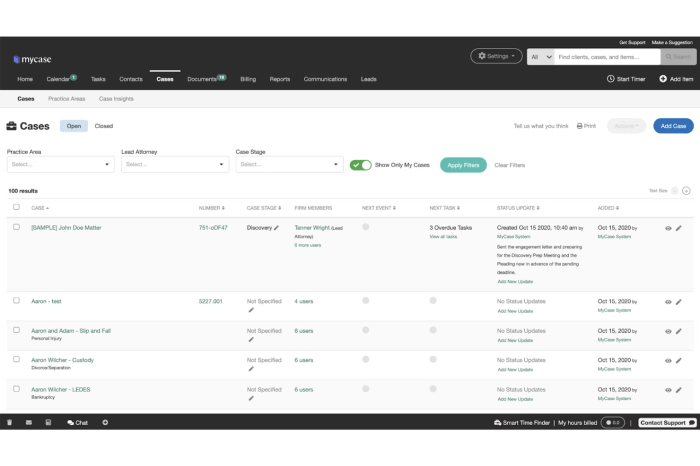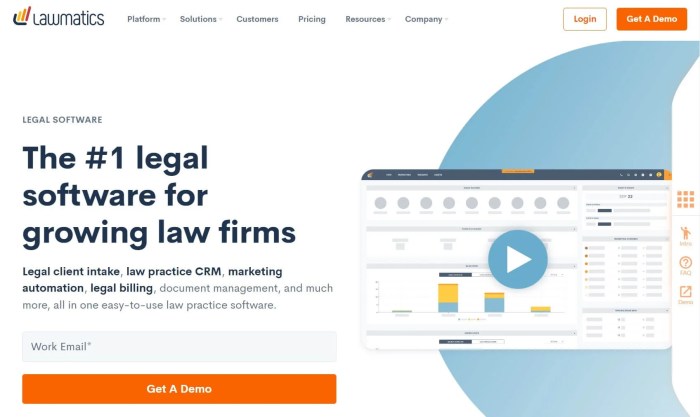Crm software for family law – The intricacies of family law demand meticulous organization and efficient communication. Juggling client files, court dates, deadlines, and communication across multiple platforms can quickly become overwhelming. This is where Customer Relationship Management (CRM) software steps in, offering a centralized hub to manage your practice effectively and enhance client experience. This detailed guide explores the benefits, features, and selection process for CRM software specifically tailored for family law professionals.
Understanding the Needs of Family Law Professionals
Family law practices face unique challenges compared to other legal specializations. The emotional intensity of cases, the sensitive nature of client information, and the frequent need for collaboration with other professionals (therapists, financial advisors, etc.) necessitate a robust and secure CRM system. Key requirements include:
- Secure Client Data Management: Protecting client confidentiality is paramount. The CRM must adhere to strict data privacy regulations (like HIPAA if applicable) and offer robust security features like encryption and access controls.
- Case Management Capabilities: Effective tracking of case details, deadlines, documents, and communication history is crucial. The CRM should facilitate easy access to all relevant information for each case.
- Calendar and Scheduling Features: Managing court appearances, client meetings, and deadlines requires a reliable integrated calendar. Automated reminders and notifications can prevent missed appointments and delays.
- Communication Tools: Secure messaging, email integration, and potentially even video conferencing capabilities streamline communication with clients and colleagues.
- Document Management: Centralized storage and easy access to legal documents, such as pleadings, financial records, and correspondence, is essential for efficient case handling.
- Reporting and Analytics: Tracking key metrics like caseload, billable hours, and client acquisition costs provides valuable insights into practice performance.
- Collaboration Tools: Facilitating secure collaboration with other professionals involved in the case, such as mediators or financial experts.
Key Features of CRM Software for Family Law
Client Relationship Management
A robust CRM system provides a 360-degree view of each client, including contact information, case history, communication logs, and financial details. This centralized repository ensures everyone in the firm has access to the most up-to-date information, fostering consistency and efficiency.
Case Management
Efficient case management is critical in family law. CRM software helps track every aspect of a case, from initial consultation to final judgment. Features such as customizable fields, automated workflows, and deadline reminders ensure that no detail is overlooked.

Source: revopsteam.com
Document Management
Securely storing and managing sensitive legal documents is a core function of a family law CRM. Features like version control, secure access permissions, and integration with cloud storage solutions ensure efficient document handling and prevent data loss.
Communication and Collaboration
Streamlined communication is key to building strong client relationships and ensuring smooth case progression. CRM systems offer secure messaging, email integration, and potentially video conferencing capabilities, fostering seamless communication with clients and colleagues.
Financial Management
Integrating billing and payment processing within the CRM system simplifies financial management. Tracking billable hours, generating invoices, and managing payments within the platform reduces administrative overhead.
Reporting and Analytics, Crm software for family law
Gain valuable insights into your practice’s performance with comprehensive reporting and analytics features. Track key metrics like caseload, billable hours, and client acquisition costs to optimize your firm’s efficiency and profitability.
Choosing the Right CRM for Your Family Law Practice
Selecting the right CRM requires careful consideration of your firm’s specific needs and budget. Key factors to consider include:
- Scalability: Choose a system that can grow with your firm, accommodating increasing caseloads and team size.
- Integration: Ensure the CRM integrates seamlessly with other software used in your practice, such as accounting software or legal research platforms.
- Security: Prioritize security features that protect client data and comply with relevant regulations.
- User-Friendliness: Opt for a system that is intuitive and easy to use for your entire team, minimizing training time and maximizing adoption.
- Cost: Compare pricing models (subscription-based, one-time purchase) and ensure the cost aligns with your budget.
- Support: Choose a vendor that provides reliable customer support and technical assistance.
Popular CRM Software Options for Family Law
Several CRM platforms offer features tailored to legal practices, including:
- Clio Manage: A popular choice for legal professionals, Clio Manage offers robust case management, document management, and billing features.
- MyCase: MyCase provides a comprehensive suite of legal practice management tools, including CRM functionality, client portals, and e-signatures.
- PracticePanther: PracticePanther is another strong contender, offering features such as time tracking, billing, and client communication tools.
- CaseFox: CaseFox is a cloud-based CRM system designed for law firms, offering case management, document management, and client communication features.
Note: This is not an exhaustive list, and the best CRM for your practice will depend on your specific needs and preferences. It is recommended to research and compare several options before making a decision.
Frequently Asked Questions (FAQ)
- Q: Is CRM software essential for family law practices? A: While not strictly mandatory, CRM software significantly enhances efficiency and client management, making it highly beneficial for most family law practices.
- Q: How much does CRM software cost? A: Pricing varies widely depending on the features, scalability, and vendor. Expect to pay a monthly or annual subscription fee, with costs ranging from a few hundred to several thousand dollars per year.
- Q: How long does it take to implement a CRM system? A: Implementation time depends on the complexity of the system and your firm’s size. Expect to dedicate several weeks to setup, data migration, and staff training.
- Q: Can CRM software integrate with existing software? A: Many CRM systems offer integrations with other legal software, accounting software, and communication platforms. Check the vendor’s specifications to ensure compatibility.
- Q: What security measures should I look for in a family law CRM? A: Look for features such as data encryption, access controls, regular security audits, and compliance with relevant data privacy regulations (like HIPAA if applicable).
Conclusion: Crm Software For Family Law
Implementing a CRM system can significantly improve the efficiency and effectiveness of your family law practice. By centralizing client information, streamlining workflows, and enhancing communication, you can improve client satisfaction, reduce administrative burdens, and ultimately, focus more on what matters most: providing exceptional legal representation.
References
- Clio Manage
- MyCase
- PracticePanther
- CaseFox
- (Add other relevant resources here)
Call to Action
Ready to streamline your family law practice? Explore the CRM options mentioned above and schedule a demo to see how the right software can transform your workflow. Contact us today for a free consultation!
Essential Questionnaire
What types of data can a family law CRM securely store?
Family law CRMs securely store client contact information, case details, financial records, court documents, communication logs, and other sensitive data, adhering to strict privacy regulations.
How does a CRM improve client communication?
CRMs facilitate better client communication through features like automated email reminders, secure messaging, and centralized communication logs, ensuring consistent and timely updates.
Can a CRM help with case management and scheduling?
Yes, CRMs offer integrated calendaring for court dates, client meetings, and deadlines, providing a centralized view of all upcoming events and tasks.
What are the typical costs associated with family law CRM software?

Source: contentmavericks.com
Costs vary depending on the features, number of users, and provider. Many offer tiered pricing plans to accommodate different practice sizes and budgets. Expect to see monthly or annual subscription fees.
How do I choose the right CRM for my family law practice?
Consider your practice’s size, specific needs, budget, and desired features. Research different providers, read reviews, and request demos to find the best fit.
